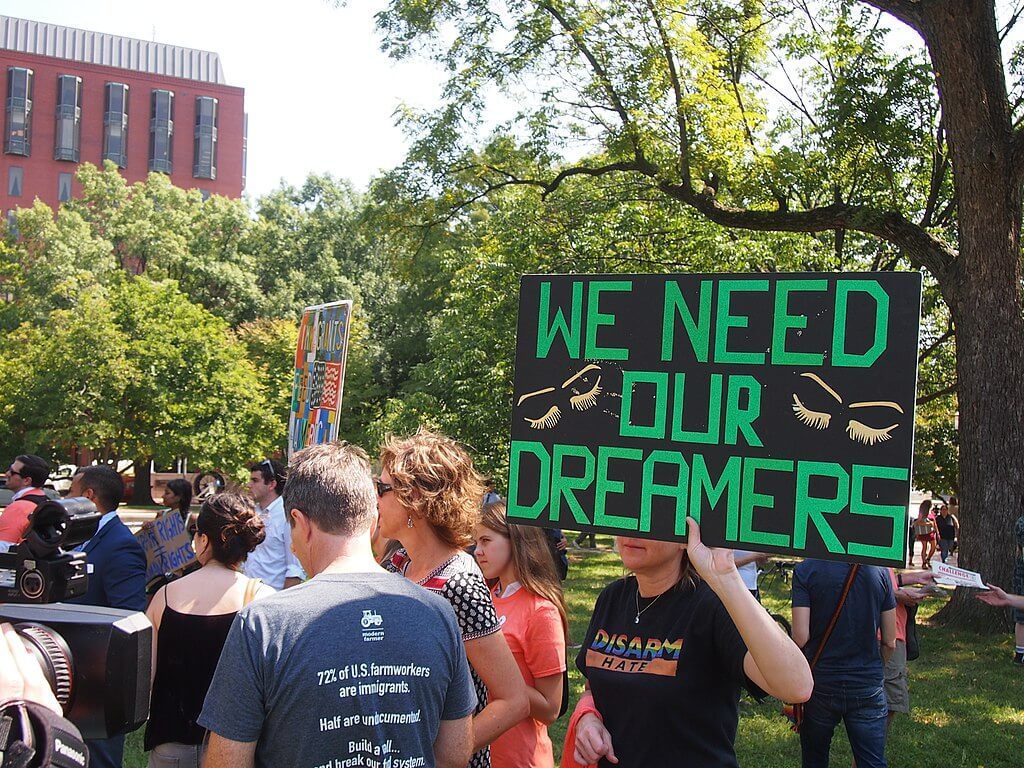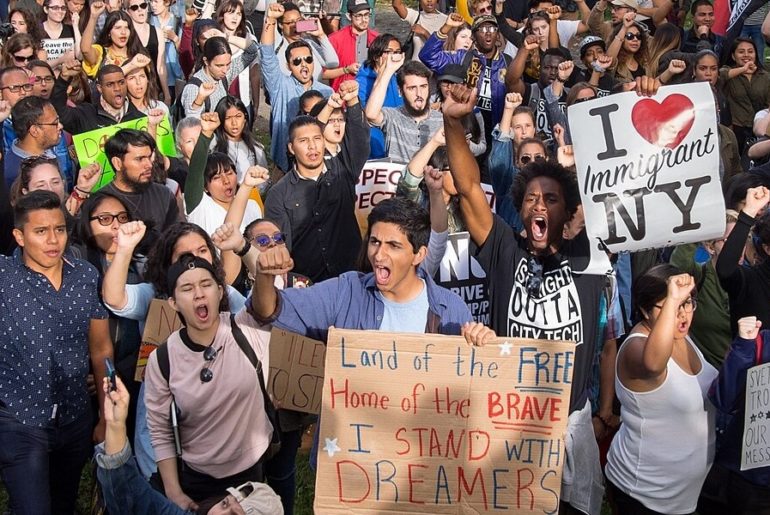On November 12, 2019, the U.S. Supreme Court is expected to hear oral arguments regarding President Trump’s proposed termination of the Deferred Action for Childhood Arrivals (DACA) program. In advance of these arguments, DACA recipients and a broad coalition of immigrants’ rights organizations launched a campaign last week to educate the public about what will happen to the 700,000 DACA recipients, their families, and the country if the Supreme Court allows DACA to be terminated.
What is the DACA program?
The DACA program was created by President Obama in June 2012. Shortly after that date, the Secretary of Homeland Security announced that it would not deport certain undocumented youth who came to the United States as children. These youth may be granted a type of temporary permission to stay in the U.S. called “deferred action”, providing relief from deportation.,They are also eligible for work authorization but are not provided lawful immigration status.
The Trump administration announced the end of the DACA program on September 5, 2017. On January 2018, a ruling by the U.S. District Court for the Northern District of California required the Department of Homeland Security to allow applications for renewals, but it did not require new applications from young people who have not been granted this benefit before.
Important information about DACA recipients
This situation is more complicated than people think. The PEW Research Center in its 2017 report states that approximately 800,000 young unauthorized immigrants have received work permits and protection from deportation through the DACA. The U.S. Citizenship and Immigration Services mentioned that Approximate Active DACA Recipients (as of June 30, 2019) are 660,880 and young with renewal pending are 35,680. In FY 2018, this agency processed 332,500 requests (renewal and pending processes).
The five countries with the highest amount of active DACA recipients are Mexico (529,760), El Salvador (23,350), Guatemala (17, 260), Honduras (15,810) y Peru (6570). These young people live mostly in California (188,420), Texas (109,090), Illinois (34,890), New York (29,390) y Florida (25,500).

The Center for American Progress analyzed data from the 2017 1-year American Community Survey (ACS) microdata and mentioned that: nearly 256,000 U.S. -born, and thus U.S.- citizen children have at least one parent who is a DACA recipient. DACA-recipient households pay $613.8 million in mortgage payments and $2.3 billion in rental payments. They also pay $5.7 billion in federal taxes and $3.1 billion in state and local taxes.
Organizations fight against the end of DACA
It has been two years since U.S. Attorney General Jeff Sessions announced that the government was terminating the DACA, program. It is expected that the Supreme Court will hear and decide the case (and the fate of DACA) on November 12, 2019.
FWD.us President Todd Shulte mentioned in his statement “The unlawful attempt to repeal of DACA has been one of the most devastating actions of the Trump Administration. Hundreds of thousands of Dreamers’ lives have been thrown into chaos, not to mention the incredible harm to their families, friends, and employers”.
On October 2nd, the national campaign “Home Is Here” began. This campaign has three purposes: that DACA recipients renew their permissions, urge the Supreme Court not to terminate the program and ask Congress to act and approve a permanent solution. Organizations participating in the campaign include CASA, the Center for American Progress, Community Change/FIRM, Coalition for Humane Immigrant Rights (CHIRLA), FWD.us, Justice Action Center, Make the Road New York, NAKASEC, National Immigration Law Center (NILC), and United We Dream (UWD).
On the same day, iPhone maker Apple Inc. presented to the Supreme Court of the United States a legal support document (‘amicus brief’) saying that they disagree with the Trump administration’s decision to close the DACA program. The document states that Apple has 443 Dreamers working for the company and that they exhibit extraordinary levels of grit and drive. They also say, “We are distressed at the prospect of ripping our DACA colleagues from the fabric of our company. This issue is a moral one: Our country made a deal with a highly vulnerable population interested in a bright future and we should keep that deal”. The story of five Dreamers that are part of the staff of vital importance to Apple is also described in the legal document.
A conglomerate of 143 companies that include the National Association of Manufacturers, the National Retail Federation, the Chamber of Commerce of the United States of America, the Retail Industry Leaders Association, the American Hotel & Lodging Association, BSA,| The Software Alliance, the Information Technology Industry Council, among others, presented the “amicus brief”to the Supreme Court where they give their support to the young people of the DACA program and point out not only economic losses that would occur but also of valuable workers for their companies.
These young people were brought to the US as children without knowing that they were “breaking the law”. In the words of one Dreamer, Martin Batalla-Vidal, lead plaintiff in the BatallaVidal v. McAleenan lawsuit to be heard by the U.S. Supreme Court and member of Make the Road New York,
Because of DACA, for the past seven years I have been able to go to school, work at my dream job, and remain with my family in the United States. The Trump administration’s cruel and unlawful termination of DACA has caused chaos and uncertainty in young immigrants across the country. DACA has been a valuable policy that has allowed hundreds of thousands to work, to go to school, and pursue their dreams. Next month, we hope the court will listen to voices of the hundreds of thousands of immigrants like me, whose lives are at stake. The court should uphold the rule of law by rejecting the Trump administration’s reckless attack on DACA and leave this vital policy in place.

